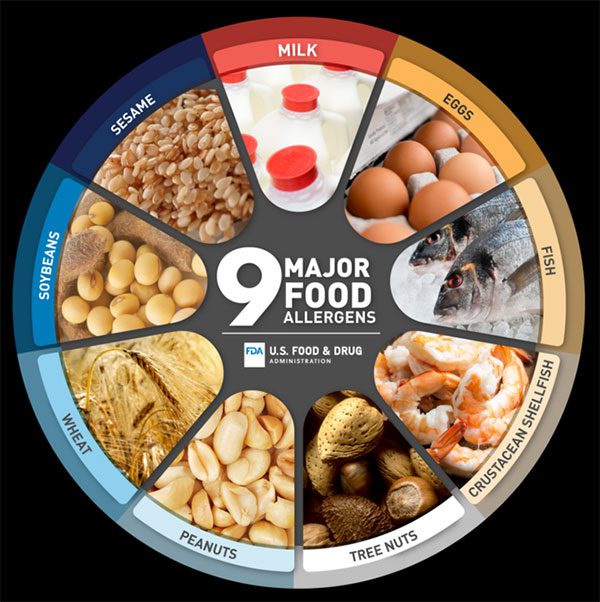Some individuals who previously consumed chicken or duck eggs without issue suddenly develop an allergy after one use. What are the signs to recognize this allergy, and what causes it?
Eggs are an inexpensive and widely consumed food in many diets. They contain many beneficial components, making them very nutritious. Egg protein is an excellent source of essential amino acids. Eggs also contain choline, vitamin D, selenium, vitamin A, and other vitamins and nutrients that boost immunity and help maintain a healthy body.
However, eggs can also be a common allergenic food. What causes egg allergies, and what signs indicate a potential egg allergy?

Eggs contain choline, vitamin D, selenium, vitamin A, and other vitamins and nutrients that boost immunity and help maintain a healthy body.
Eggs Are Among the Top 9 Allergenic Foods
While many different foods can trigger allergic reactions, the U.S. Food Allergy Consumer Protection and Labeling Act has identified 9 major allergenic foods, including:
- Milk
- Eggs
- Fish (e.g., bass, flounder, cod)
- Crustaceans (crab, lobster, shrimp)
- Tree nuts (almonds, walnuts, hazelnuts)
- Peanuts
- Wheat
- Soybeans
- Sesame seeds
Many children and adults are allergic to eggs, making them one of the most common allergenic foods. Egg allergy is estimated to affect 1-2% of children. Most children with egg allergies eventually develop tolerance to eggs by age 16.
According to Dr. Minh Huong, food allergy conditions are often related to genetics, so families with members who have allergic tendencies or diseases are at a higher risk of having a child who may develop one or more allergy-related conditions such as allergic rhinitis, allergic asthma, eczema, and food allergies.
Egg allergies often resolve on their own in young children, making them less common in adults. Based on a study of self-reported food allergies, the rate of reported egg allergy reactions in adults is 0.6% in the U.S. Although egg allergies are rare in adults, there have been reports of cases of egg allergy onset in adulthood.
Symptoms of egg allergy can range from mild to severe and life-threatening, and they can change over time. The most common symptoms are skin-related, including rashes, hives, and eczema. Other symptoms may involve the digestive and respiratory systems, including vomiting, diarrhea, abdominal pain, indigestion, wheezing, coughing, nasal inflammation, nasal congestion, and difficulty breathing…
In cases of egg allergy onset in adults, symptoms reported include: swollen eyelids and lips, itchy throat, red ears, red eyes, and tearing.

According to the U.S. Food and Drug Administration, eggs are one of the nine allergenic foods. (Photo: SKDS).
Causes of Adult-Onset Egg Allergy
Egg allergy occurs when the body’s immune system becomes sensitive and overreacts to proteins found in both the egg white and yolk. This allergy happens when the body misidentifies egg proteins as a threat.
The proteins in eggs trigger the body to produce antibodies, such as immunoglobulin E (IgE)—the most common antibody involved in allergic reactions to eggs. IgE binds to the allergen, the egg protein in the body, and signals the immune system to release chemicals that lead to the current signs and symptoms.
The body’s reaction to eggs is an allergic reaction. Food allergies, including egg allergies, can be serious and life-threatening. It is important to note that non-IgE-mediated reactions can also occur with egg allergies.
In cases of sudden adult-onset egg allergies, this condition may be associated with a history of prior food intolerances.
However, the onset of the allergy can also occur suddenly in adults with no prior food intolerance history. Stress, changes in gut bacteria, inflammatory bowel disorders, and certain medications have been shown to contribute to the development of egg allergies in adults.
Diagnosis and Treatment of Egg Allergy
Simple testing cannot be used to diagnose egg or food allergies. Physicians will review various test results in conjunction with symptoms, medical history, family history, and physical examinations to determine the likelihood of a food allergy for assessment and treatment. Food allergy testing is also useful in identifying which foods may be related to food allergies.
The best way to manage an egg allergy is to avoid eating eggs. The majority of eggs consumed in the U.S. come from chickens. In contrast, in other countries, most eggs consumed may come from other bird species such as ducks, geese, or quails. Reports of cross-reactivity between different bird eggs have been documented.
Many food items contain eggs as an ingredient, even if this may not be obvious, such as pasta, salad dressings, mayonnaise, meatloaf, and pudding… The U.S. Food Allergy Consumer Protection and Labeling Act of 2004 requires packaged food manufacturers in the U.S. to label eggs or egg products on food labels if they contain eggs. Additionally, some vaccines contain egg protein (ovalbumin), so they should be avoided to prevent the risk of severe reactions if administered to individuals with egg allergies.
Food allergy testing should be conducted if you experience mild symptoms shortly after eating but have not been diagnosed with a food allergy, which may include:
|


















































